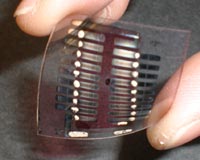 |
Tokyo, Japan (SPX) May 27, 2009 SANYO Electric has announced that it has broken its own record for the world's highest energy conversion efficiency in practical size (100 cm2 or more) crystalline silicon-type solar cells, achieving a efficiency of 23.0% (until now 22.3%) at a research level for its proprietary HIT solar photovoltaic cells.
Background The increase in the solar cell conversion efficiency this time is accompanied by significant advances in lowering the production cost of the photovoltaic system and the reduction in the use of raw materials such as silicon. This achievement by SANYO represents the first time that a photovoltaic manufacturer has broken through the 23% mark in conversion efficiency at the research-level for practical-sized solar cells, and further cements the leadership of SANYO's HIT solar cell which is renowned for its high conversion efficiency. For now on SANYO will continue to advance its efforts into applying this research-level achievement into mass production, and promote further research into energy efficiency, as well as reductions in cost and materials.
Overview of the elemental technology enabling the high energy conversion efficiency SANYO has recently managed to improve the quality of the HIT solar cell junction through developing a technology for depositing a higher quality a-Si layer over the c-Si substrate while protecting the c-Si surface from being damaged. The result was an increase in the open circuit voltage (Voc) from 0.725V to 0.729V. 2. Reduction of optical absorption loss - In the solar cell, sunlight that hits its surface needs to be guided to the c-Si, the energy generation layer, with the smallest possible absorption loss. As for the HIT solar cell, reduction of optical absorption loss in the a-Si layer, which covers the front and rear surfaces of the c-Si, and the transparent conductive layer was a challenge. Absorption of short-wavelength solar radiation by the a-Si layer and that of long-wavelength solar radiation by the transparent conductive layer were the causes of the optical absorption loss. SANYO has recently developed know-how to reduce optical absorption loss in both the a-Si layer and transparent conductive layer. As a result, the short circuit current (Isc) was improved from 39.2mA/cm2 to 39.5mA/cm2. 3. Reduction of resistance loss - In the solar cell, generated electric current is collected by and taken out through the surface grid electrode. SANYO has recently realized lower-resistance electrode material for use in the grid electrode and a higher-aspect ratio through improving printing technology, leading to a success in reduction of resistance loss when an electric current flows through the grid electrode. As a result, the fill factor (FF) *9 was improved from 0.791 to 0.80. Share This Article With Planet Earth
Related Links SANYO Electric All About Solar Energy at SolarDaily.com
 Glass Windows Coated With World's Tiniest Working Solar Cells
Glass Windows Coated With World's Tiniest Working Solar CellsBurtonsville MD (SPX) May 27, 2009 New Energy Technologies has announced that the Company is continuing to further advance the development of its tinted transparent glass SolarWindows capable of generating electricity by coating glass surfaces with the world's smallest known organic solar cells. New Energy's SolarWindow technology uses an organic solar array, which achieves transparency through the creative use of conductin ... read more |
|
| The content herein, unless otherwise known to be public domain, are Copyright 1995-2009 - SpaceDaily. AFP and UPI Wire Stories are copyright Agence France-Presse and United Press International. ESA Portal Reports are copyright European Space Agency. All NASA sourced material is public domain. Additional copyrights may apply in whole or part to other bona fide parties. Advertising does not imply endorsement,agreement or approval of any opinions, statements or information provided by SpaceDaily on any Web page published or hosted by SpaceDaily. Privacy Statement |